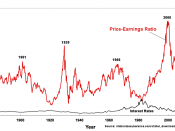Academics teach us that we can't time the market. Price movements are random (Random Walk Theory), all known information is priced into a stock (Efficient Market Hypothesis), etc. The problem with the theories they teach in school is that they all assume that investors are rational. I don't buy that for a second. I've been trading for eight years and been a very astute student of the market for the last few, and I still make irrational decisions. There is a whole area of finance devoted to this subject called, behavioural finance. It's a fact; humans have emotions. When we let our emotions dictate our actions we often act irrationally. For example, I'm sure everyone knows someone (or has personal experience) that has done something crazy because they are in love. Love is a strong emotion, along with fear and greed. The latter two emotions are most responsible for driving the action of the stock market.
The majority of the investment community will disagree with me, but in order to make educated decisions, the decision maker should hear both sides of the story. In investing there are two sides - the bulls and the bears. Which am I, you ask? Well, it all depends on the asset class. The "perma-bulls" showcased in the media through the likes of CNBC and The Wall Street Journal will only give you one side of the story. Over the next few pages, I will attempt to provide insight as to where the financial markets may be headed over the short, intermediate and long-term using fundamentals as my basis, and not Wall Street / Bay Street hype.
I will begin by making a case for why the stock markets will not provide the returns which investors have grown accustomed to. I will support my case...


